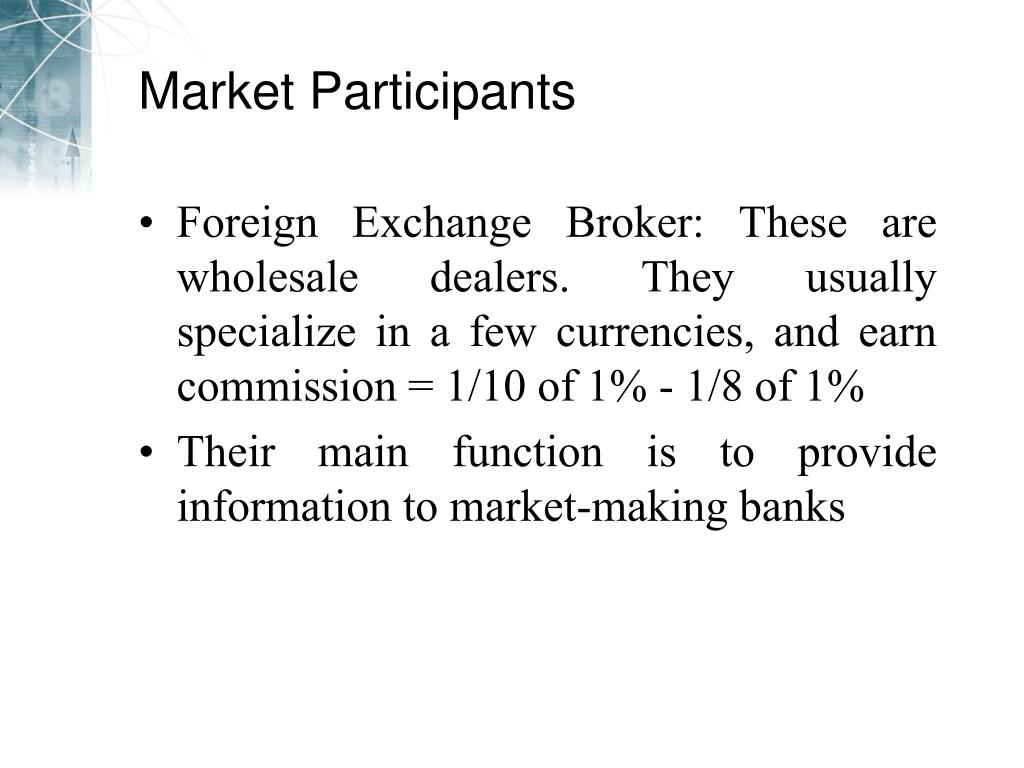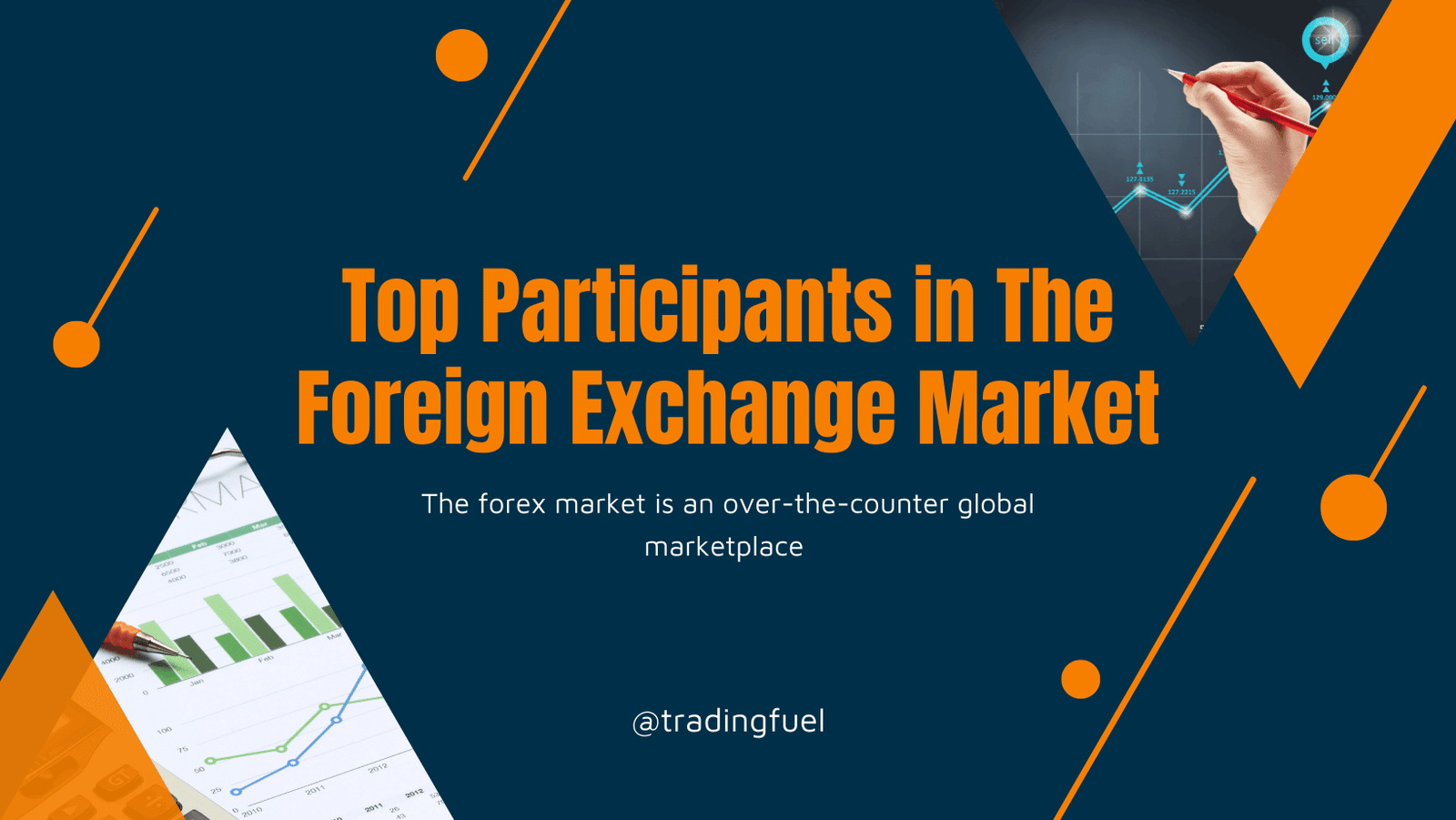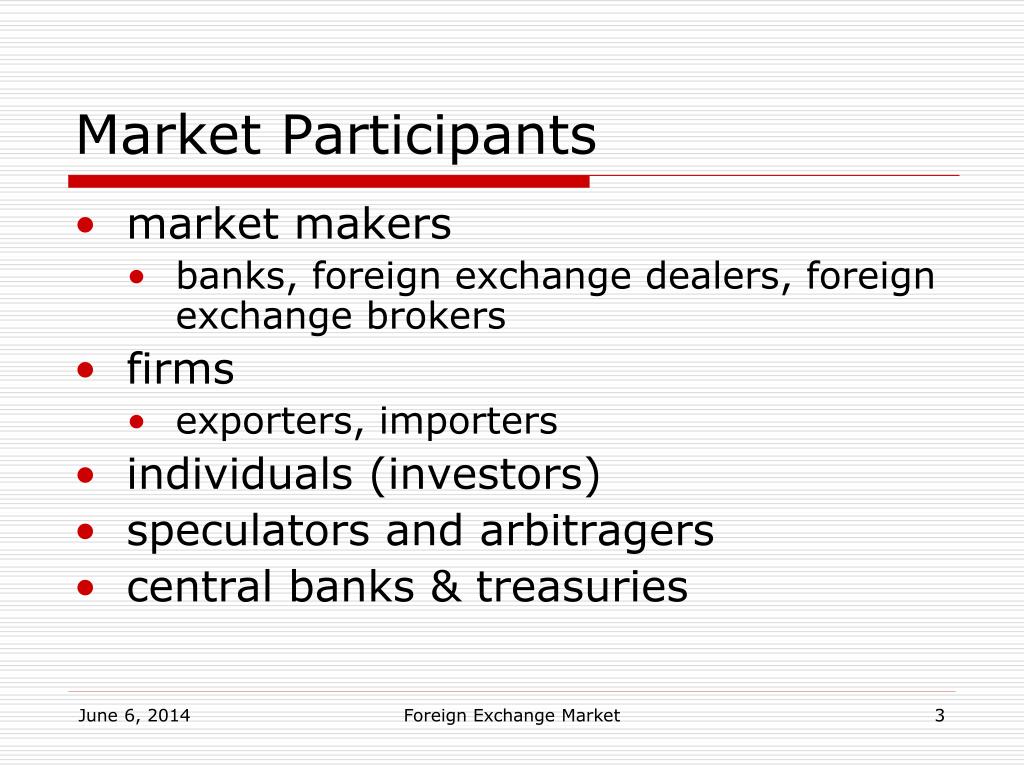Market participants in foreign exchange market – In the dynamic world of global finance, the foreign exchange market stands as a crucial hub where currencies are traded and exchanged. At the heart of this market lies a diverse array of participants, each playing a distinct role in shaping its intricate dynamics. From central banks to retail investors, this comprehensive overview delves into the key market participants in the foreign exchange market, exploring their motivations, strategies, and impact on the global financial landscape.
As we delve deeper into this fascinating realm, we will uncover the role of central banks in stabilizing currencies, the essential functions performed by commercial banks, the motivations and contributions of non-bank financial institutions, and the strategies employed by corporations to manage foreign exchange risk.
Market Participants in the Foreign Exchange Market
The foreign exchange market (forex market) is a global, decentralized market for the trading of currencies. It is the largest financial market in the world, with a daily trading volume of over $5 trillion. The forex market is made up of a diverse group of participants, each with its own unique role to play.
The main types of market participants in the forex market are:
- Central banks: Central banks are responsible for managing the monetary policy of their respective countries. They buy and sell currencies to influence the value of their own currency and to manage their country’s foreign exchange reserves.
- Commercial banks: Commercial banks are the largest participants in the forex market. They buy and sell currencies on behalf of their customers, who include businesses, individuals, and other financial institutions.
- Investment banks: Investment banks are financial institutions that provide a range of services to businesses and governments, including foreign exchange trading. They buy and sell currencies for their own account, as well as for their clients.
- Hedge funds: Hedge funds are investment funds that use a variety of strategies to generate returns for their investors. Some hedge funds specialize in foreign exchange trading.
- Retail traders: Retail traders are individuals who trade currencies on their own behalf. They typically trade smaller amounts of currency than other market participants.
Each type of market participant plays an important role in the forex market. Central banks help to stabilize the value of currencies, commercial banks facilitate the flow of money around the world, investment banks provide liquidity and expertise to the market, hedge funds speculate on the direction of currency prices, and retail traders add to the overall volume of trading.
The forex market is a complex and dynamic market, and the actions of its participants can have a significant impact on the value of currencies. By understanding the different types of market participants and their roles, you can gain a better understanding of how the forex market works.
Central Banks: Market Participants In Foreign Exchange Market

Central banks play a crucial role in the foreign exchange market, influencing exchange rates and managing international monetary systems.
Browse the multiple elements of write the meaning of foreign exchange market to gain a more broad understanding.
Central banks intervene in the foreign exchange market using various instruments, including:
- Foreign exchange reserves: Buying or selling foreign currencies to influence the value of their domestic currency.
- Interest rate adjustments: Changing interest rates to make their currency more or less attractive to investors.
- Quantitative easing: Expanding the money supply to weaken their currency.
Central bank intervention in the foreign exchange market can have several objectives:
- Managing exchange rate volatility: Smoothing out sharp fluctuations in exchange rates to maintain economic stability.
- Maintaining a competitive exchange rate: Ensuring their currency remains at a level that supports exports and economic growth.
- Influencing inflation: Adjusting exchange rates to control inflation by making imports cheaper or more expensive.
- Supporting monetary policy: Using foreign exchange interventions to complement domestic monetary policy objectives.
Commercial Banks
Commercial banks are essential participants in the foreign exchange market, acting as intermediaries between individuals, businesses, and central banks. They facilitate a wide range of foreign exchange transactions and play a crucial role in managing foreign exchange risk.
Types of Foreign Exchange Transactions Conducted by Commercial Banks
Commercial banks engage in various types of foreign exchange transactions, including:
- Spot transactions: Immediate exchange of currencies at the prevailing market rate.
- Forward transactions: Contracts to exchange currencies at a predetermined rate on a future date.
- Currency swaps: Exchange of currencies with an agreement to reverse the transaction at a later date.
- Options: Contracts giving the buyer the right, but not the obligation, to exchange currencies at a specified rate within a specific period.
Foreign Exchange Risk Management by Commercial Banks
Commercial banks employ various strategies to manage foreign exchange risk, including:
- Matching assets and liabilities: Balancing foreign currency assets and liabilities to minimize exposure to exchange rate fluctuations.
- Hedging: Using financial instruments, such as forward contracts or options, to offset potential losses from adverse exchange rate movements.
- Diversification: Distributing foreign exchange exposure across multiple currencies to reduce the impact of fluctuations in any single currency.
- Limiting exposure: Setting limits on the amount of foreign exchange risk that the bank is willing to take.
Non-Bank Financial Institutions
Non-bank financial institutions (NBFIs) are a diverse group of financial intermediaries that play a significant role in the foreign exchange market. These institutions include investment banks, hedge funds, mutual funds, insurance companies, and pension funds.
NBFIs participate in the foreign exchange market for a variety of reasons. Some NBFIs, such as investment banks, act as market makers and provide liquidity to the market. Others, such as hedge funds, use the foreign exchange market to speculate on currency movements. Still others, such as mutual funds, use the foreign exchange market to diversify their portfolios.
NBFIs contribute to the liquidity of the foreign exchange market by providing a pool of buyers and sellers. This liquidity is essential for the efficient functioning of the market and helps to ensure that currencies can be exchanged quickly and easily.
Investment Banks
Investment banks are one of the most important types of NBFIs in the foreign exchange market. They act as market makers and provide liquidity to the market by quoting bid and ask prices for currencies. Investment banks also provide a range of other services to their clients, such as foreign exchange advisory services and currency hedging.
Hedge Funds
Hedge funds are another important type of NBFI in the foreign exchange market. Hedge funds use the foreign exchange market to speculate on currency movements. They typically use sophisticated trading strategies and may take large positions in the market.
Mutual Funds, Market participants in foreign exchange market
Mutual funds are investment funds that pool money from individual investors and invest it in a diversified portfolio of assets. Mutual funds often invest in foreign currencies as a way to diversify their portfolios.
Insurance Companies
Insurance companies are financial institutions that provide insurance against risks. Insurance companies often invest in foreign currencies as a way to diversify their portfolios and to hedge against currency risks.
Pension Funds
Pension funds are investment funds that manage the retirement savings of employees. Pension funds often invest in foreign currencies as a way to diversify their portfolios and to hedge against currency risks.
Corporations

Corporations are active participants in the foreign exchange market for various reasons. They engage in international trade, import raw materials, export finished goods, and invest in overseas operations, all of which involve foreign exchange transactions.
Corporations conduct a range of foreign exchange transactions, including:
– Spot transactions: Buying or selling foreign currencies for immediate delivery.
– Forward transactions: Agreeing to buy or sell foreign currencies at a predetermined rate on a future date.
– Currency swaps: Exchanging one currency for another with an agreement to reverse the transaction at a later date.
Corporations manage foreign exchange risk through various strategies, including:
– Hedging: Using financial instruments to offset potential losses from currency fluctuations.
– Diversification: Investing in assets denominated in different currencies to reduce exposure to any single currency.
– Natural hedging: Balancing foreign currency assets and liabilities to minimize the impact of exchange rate changes.
Retail Investors
Retail investors play a significant role in the foreign exchange market, contributing to its liquidity and volatility. They are individuals who trade currencies for speculative purposes or to hedge against foreign currency risks.
Motivations for retail investors to participate in the foreign exchange market include:
- Speculation: Retail investors seek to profit from fluctuations in currency exchange rates.
- Hedging: Businesses and individuals with foreign currency exposure use foreign exchange trading to reduce their risk.
- Convenience: Online trading platforms make it easy for retail investors to access the foreign exchange market.
However, retail investors should be aware of the risks involved in foreign exchange trading:
- Volatility: Currency exchange rates can fluctuate rapidly, leading to potential losses.
- Leverage: Brokers offer leverage, which can magnify both profits and losses.
- Counterparty risk: Retail investors rely on brokers to execute their trades, introducing counterparty risk.
To mitigate these risks, retail investors should:
- Educate themselves: Understand the basics of foreign exchange trading and risk management.
- Start small: Invest only what they can afford to lose.
- Use a reputable broker: Choose a broker regulated by a reputable authority.
Foreign Exchange Brokers
Foreign exchange brokers play a crucial role in the foreign exchange market by facilitating the exchange of currencies between different parties. They act as intermediaries, connecting buyers and sellers of foreign currencies, and provide liquidity to the market.
Discover more by delving into foreign exchange market volume ranking further.
There are different types of foreign exchange brokers, each catering to specific needs of market participants. Some of the common types include:
- Retail brokers: These brokers provide services to individual investors and small businesses, offering a range of trading platforms and tools.
- Institutional brokers: These brokers focus on serving large financial institutions, such as banks, hedge funds, and corporations, providing customized solutions and high-volume trading capabilities.
- Electronic brokers (ECNs): These brokers use electronic platforms to match buy and sell orders, offering transparency and anonymity to traders.
Using a foreign exchange broker offers several benefits to market participants. These include:
- Access to global markets: Brokers provide access to a wide range of currency pairs, allowing traders to participate in the global foreign exchange market.
- Liquidity: Brokers maintain deep liquidity pools, ensuring that traders can execute their orders quickly and efficiently.
- Trading tools and support: Many brokers offer a range of trading tools, such as charts, technical analysis tools, and educational resources, to assist traders in making informed decisions.
- Risk management: Brokers provide risk management tools, such as stop-loss orders and margin calls, to help traders manage their risk exposure.
Electronic Trading Platforms

Electronic trading platforms have revolutionized the foreign exchange market, providing a centralized marketplace where participants can trade currencies with greater efficiency, transparency, and accessibility. These platforms offer a range of advantages and have significantly altered the market dynamics.
Advantages of Electronic Trading Platforms
- Increased liquidity: By connecting buyers and sellers from around the globe, electronic platforms create a deeper and more liquid market, facilitating faster execution of trades.
- Transparency: Platform trading data is often publicly available, providing greater visibility into market activity and reducing the potential for manipulation.
- Efficiency: Automated order matching and execution systems reduce transaction times and costs, streamlining the trading process.
li>Accessibility: Online platforms enable traders to access the market from anywhere with an internet connection, expanding participation beyond traditional financial centers.
Disadvantages of Electronic Trading Platforms
- Technology dependence: Electronic platforms rely heavily on technology, and any technical issues can disrupt trading activities.
- Increased volatility: The fast-paced nature of electronic trading can lead to rapid price fluctuations and increased volatility.
- Lack of personal interaction: Unlike traditional over-the-counter trading, electronic platforms offer limited opportunities for direct interaction between participants.
Impact on the Foreign Exchange Market
Electronic trading platforms have transformed the foreign exchange market in several ways:
- Increased competition: The ease of access provided by electronic platforms has increased competition among market participants, driving down spreads and improving pricing for traders.
- Reduced barriers to entry: Small traders and retail investors can now participate in the foreign exchange market with lower barriers to entry.
- Globalized market: Electronic platforms have created a truly globalized foreign exchange market, allowing participants from different countries to trade with each other seamlessly.
In summary, electronic trading platforms have significantly enhanced the efficiency, transparency, and accessibility of the foreign exchange market. While they have certain disadvantages, the overall benefits they provide have made them an indispensable tool for market participants.
Last Word
In conclusion, the foreign exchange market is a complex and ever-evolving ecosystem, driven by a diverse range of participants. From central banks to retail investors, each player brings a unique perspective and set of objectives to this global marketplace. Understanding the roles and motivations of these market participants is essential for navigating the complexities of the foreign exchange market and harnessing its potential for financial success.
Obtain direct knowledge about the efficiency of foreign exchange market structure through case studies.
